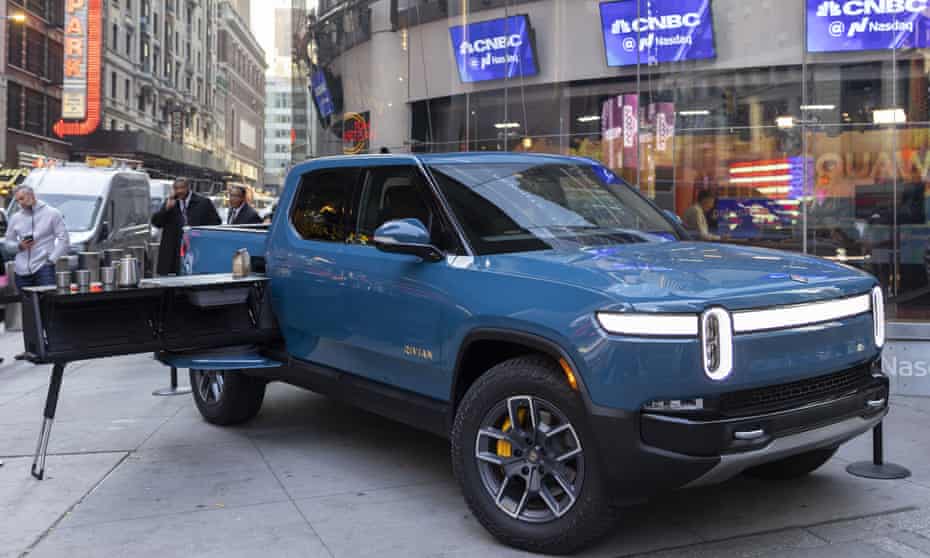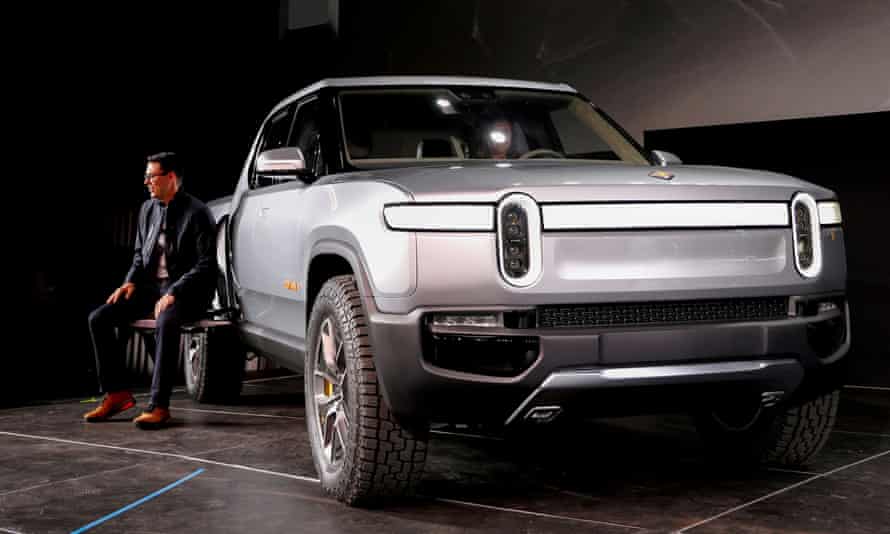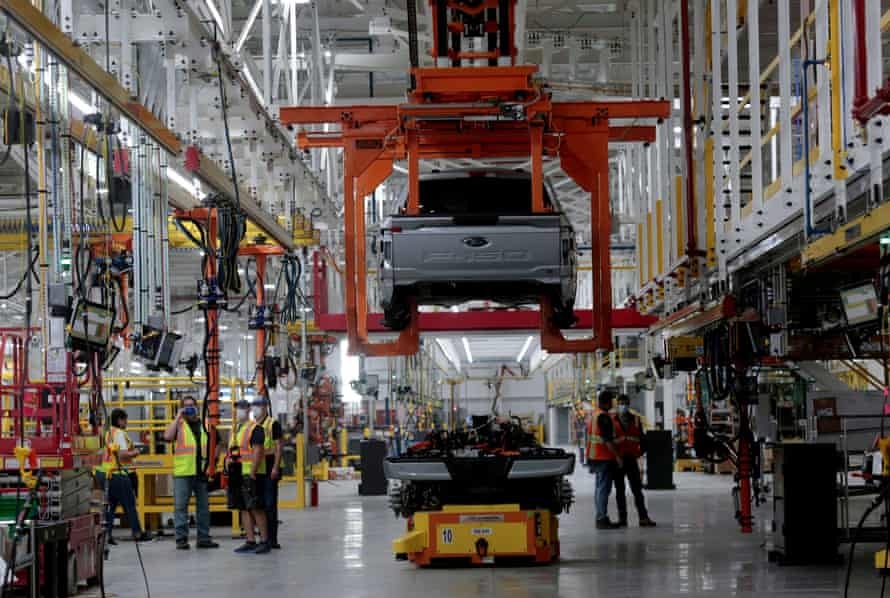Will Rivian’s electric vehicles end Detroit’s reign over the US auto industry?
Investors have salivated over the Illinois automaker – but juggernauts like Ford and GM still have plenty of advantages

Normal, Illinois, a town of just 55,000 people, could be the future of car manufacturing, according to Wall Street traders, at least. Six hours’ drive away in Detroit, home of the US auto industry for more than 100 years, they are not so sure.
The town gained international attention earlier this month after the Amazon-backed Rivian, an electric vehicle startup, went public in one of the biggest stock market debuts since Facebook. Despite the fact that the company has delivered only about 150 trucks, Rivian is now valued at about $100bn, more than either Ford or General Motors, which produced about 10m vehicles between them in 2020.
Investor enthusiasm for Rivian – especially after its electric vehicle rival Tesla hit a $1tn valuation – has once more raised questions over whether Detroit’s century-long reign over the auto industry is under threat. But not everyone is convinced.
“People have been quick to dismiss the old guard as new players have come in and tried to take over, but I don’t think that’s going to happen because Ford and GM are positioned to do so well with their logistical chain of production,” said Jessica Caldwell, executive director of insights at the automotive analyst Edmunds.

Still, the upstart’s momentum shouldn’t be dismissed and the company’s clear vision, cult-ish “cool factor” and potential are legitimate forces driving the stock’s ascent. Rivian’s stylish R1T electric trucks have garnered rave reviews and orders are in for another 55,000 more. The company announced plans for a second plant in the days following its initial public offering (IPO), will roll out an electric SUV next month, and is ambitiously aiming to boost production to 1m vehicles per year within a decade.
The company has powerful support. Amazon, Rivian’s biggest backer, owns a 20% stake in the company and has an order for 100,000 electric vans to deliver packages to e-commerce customers, while Ford’s 12% stake lends even more legitimacy, although the two have ended plans to develop vehicles together.
But skeptics say simple back-of-the-napkin math raises doubts. Rivian has attracted some of the industry’s top manufacturing logistics talent to guide its growth, but scale-ups are exceedingly difficult, and the company is planning to move at an unprecedented pace that would outperform Tesla in its early years, said Brett Smith, technology director at the Michigan-based Center for Automotive Research. “Actually getting this into the hands of customers in some kind of volume – that’s not a small thing,” Smith said.
At a price of $70,000 per truck, the company’s valuation at its peak implied that within 10 years it would be selling around 3m vehicles, or about 12% of the auto market, said David Trainer, founder of the investment research firm New Constructs. That’s more than BMW sold last year.
New Constructs estimate Rivian’s value at $13bn “at best”, and Trainer called the IPO “crazy”.
“The underlying business model may work, but there’s no reason to pay a price [for stock] that implies that they’re going to effectively put Ford out of business,” he said.
It took Tesla about five years to start production on a second line and it is on pace to produce fewer than 1m cars 12 years after its IPO. Tesla also captured its share of the market while it was the only real player in electric vehicles (EVs). A week after the Rivian IPO, GM rolled out its electric Hummer, while Ford’s F-150 Lightning, the first electric version of its bestselling truck, introduced earlier this year, already has 150,000 preorders. Tesla customers comprise 11% of those sales.
The EV market is expected to take off in the coming years. GM and Ford are each aiming to sell 1m EVs annually by 2025 and will probably do so at a lower price point that appeals to the mass market more than the “early adopters” and luxury buyers who make up most of Rivian’s customers.

Traditional automakers also have the infrastructure in place to ramp up production much quicker than Rivian – Ford announced plans for the Lightning in late 2020 and is delivering the first batch by early 2022, a process that took Rivian about six years. That’s coupled with Ford’s built-in brand loyalty and an established marketing operation that is selling products with household names, Caldwell noted.
“The Ford 150 Lightning – it’s hard to compete against that with its price, brand, and the sheer marketing and advertising muscles that Ford has,” Caldwell said.
The traditional automakers also have in place a network of dealerships to service new products when the inevitable hiccups hit, Smith noted. That could create frustration with Rivian and presents a costly logistical challenge when a car breaks down.
“Rivian is exciting, Rivian has a lot of positives, but they don’t have proof that they can support their vehicles on the road yet,” Smith said. “That’s not to say they won’t, but for consumers and commercial buyers, that could be a huge problem.”
Though Rivian’s IPO infused it with an impressive $11bn-plus in cash, Ford and GM’s coffers somewhat negate that advantage, Trainer said. Capital can be a huge plus for a tech company such as Netflix, but it is “not nearly as effective as a weapon in old-line manufacturing because your competitors also have a lot of capital”, he added.
Still, there are reasons for Detroit to be concerned, and the automakers’ legacy cuts both ways, Smith said. Companies have to figure out how to efficiently wind down combustion production while scaling up EV production, a challenge Rivian doesn’t have to face.
“If you don’t have to worry about spending money on the legacy, all you have to do is develop the new product, technology and processes, and if you have access to cash, then you could be at an advantage,” he said.
Though Ford appeared somewhat unprepared for the EV transition several years ago, analysts say the F-150’s swift mobilization shut down any skepticism, and the company was “able to keep their eye on the competition” in a way that showed it was ready. And by the week’s end, Rivian’s stock price dropped as investors took profits and the number of unanswered questions weighed on its future.
“I could be wrong about this, but like any hype, any bubble, and this is a bubble, there will be some huge winners, and there will be a lot more losers,” Smith said. “I suspect that’ll be the case here. There have been a lot of startups over 125 years of the automotive industry … and most of them have failed.”